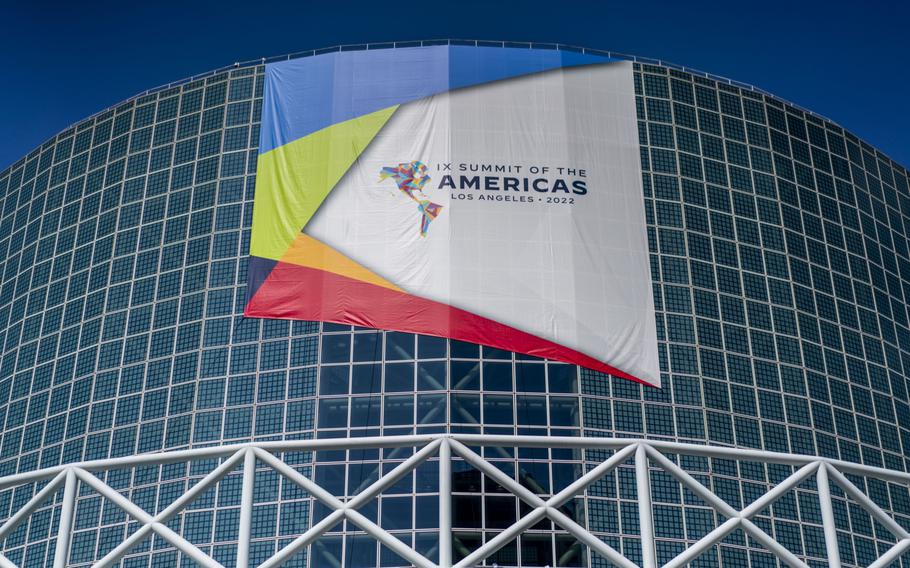
Signage outside the LA Convention Center for the Summit of the Americas in Los Angeles on June 7, 2022. (Kyle Grillot/Bloomberg)
President Joe Biden's attempt to shift focus to the Western Hemisphere has gotten off to a bumpy start, with the leader of Mexico snubbing his invitation to a Los Angeles summit this week and doubts swirling about the strength of U.S. influence in the region.
The White House has billed the Summit of the Americas that Biden will attend starting Wednesday as a chance to tackle regional challenges including migration, climate change and economic disparities. Yet the president's attention has been diverted by unrelenting crises including inflation, the war in Ukraine and a baby-formula shortage in the world's largest economy.
Decisions by Mexican President Andres Manuel Lopez Obrador and key Central American leaders to skip the California meetings have overshadowed Biden's agenda and highlighted diminished U.S. clout. Though attendees are expected to sign agreements on migration and other issues that have plagued the region for decades, the specifics are in many cases vague and experts say major breakthroughs are unlikely.
"In a world where people are losing faith in democracy, it gets even more difficult to show real results," said Andrew Rudman, director of the Woodrow Wilson Center's Mexico Institute. "They're not problems that a single country can fix but they're also not problems you can fix quickly."
Biden has sought to repair relationships in Latin America frayed over former President Donald Trump's hard-line demands on immigration and trade. Biden will be the first U.S. leader to attend the summit — held about every three years — since 2015. The U.S. last hosted the gathering in 1994.
The U.S. president wants to advance democratic governance at the confab — a subject of the original summit in 1994 and a main theme of his presidency. His administration decided against inviting the autocratic leaders of Cuba, Venezuela and Nicaragua to Los Angeles, a move that triggered Lopez Obrador's boycott and highlights divisions over U.S. efforts to project power over its neighbors.
The leaders of the Northern Triangle countries of Guatemala, Honduras and El Salvador — which have long been major sources of migration to the U.S. — also will not attend, raising questions about whether the nations can broker any lasting agreement on the issue.
"The Summit of the Americas is a reflection of a polarized hemisphere where there is a great deal of fragmentation, polarization and populism," said former Mexican foreign ministry official Vanessa Rubio Marquez.
A regional migration pact is set to be the centerpiece of Biden's summit visit. The document is expected to be signed Friday, according to a senior administration official. Participating countries will pledge financial support for nations hosting large migrant populations and improvements on cooperation to better control flows of people across the region and provide them legal jobs, according to a draft declaration seen by Bloomberg News.
The document isn't final and it's not clear if all nations attending the summit will sign it.
Vice President Kamala Harris earlier in the week announced more than $1.9 billion in new private-sector investments in the Northern Triangle, including new commitments from Visa and Gap, in an effort to address persistent poverty that has caused people there to flee the U.S. for a better life.
Uncontrolled migration across the U.S. southern border remains a political vulnerability for Biden, whose administration faces historic levels of migrants and asylum-seekers. But the initiatives agreed to in Los Angeles are unlikely to significantly reduce migration without a major overhaul of U.S. immigration laws to address refugee and asylum processes as well as the more than 10 million undocumented people living in the U.S. — legislation that's eluded presidents dating back to Ronald Reagan.
"Game changers really need to come from the U.S. Congress and on the domestic front," said Eric Olson, director of policy and strategic initiatives at the Seattle International Foundation, a group focused on development and governance in Central America.
Biden is also expected to discuss regional development, the Covid-19 pandemic and climate change. The president is due to deliver remarks at the opening ceremony on a new economic partnership with the region, according to a senior administration official.
On Wednesday, the administration will announce a plan to bolster health systems in the region and end what senior administration officials called the acute phase of the pandemic, including training for 500,000 health workers in Latin America and the Caribbean over five years.
An accord on climate resilience is also expected during the week. None of the announcements are likely to include major new U.S. investments in the region or significant policy shifts.
The U.S. leader secured a victory when Brazilian President Jair Bolsonaro decided to attend the summit after initially threatening to skip it to focus on his re-election campaign. The two men, who have a frosty relationship due in part to Bolsonaro's open admiration for Biden's predecessor, Donald Trump, are expected to meet on Thursday.
Bolsonaro raised tensions on Tuesday, ahead of the meeting, by echoing Trump's false claims that Biden's election victory was fraudulent — dimming chances for a thaw in their relationship.
A senior administration official responded by saying that Biden and Bolsonaro will likely discuss their disagreements in what the official called a candid conversation.
Bloomberg's Eric Martin, Maya Averbuch, Josh Wingrove and Justin Sink contributed to this report.